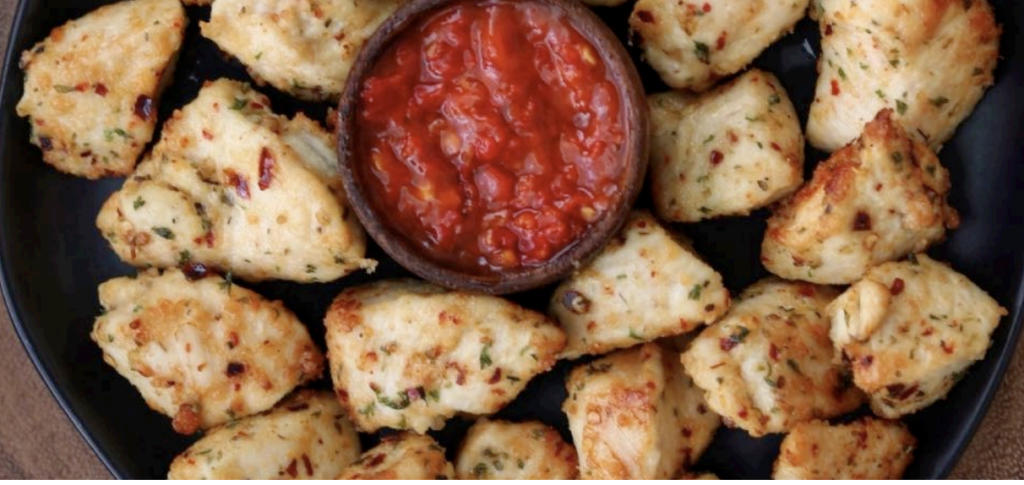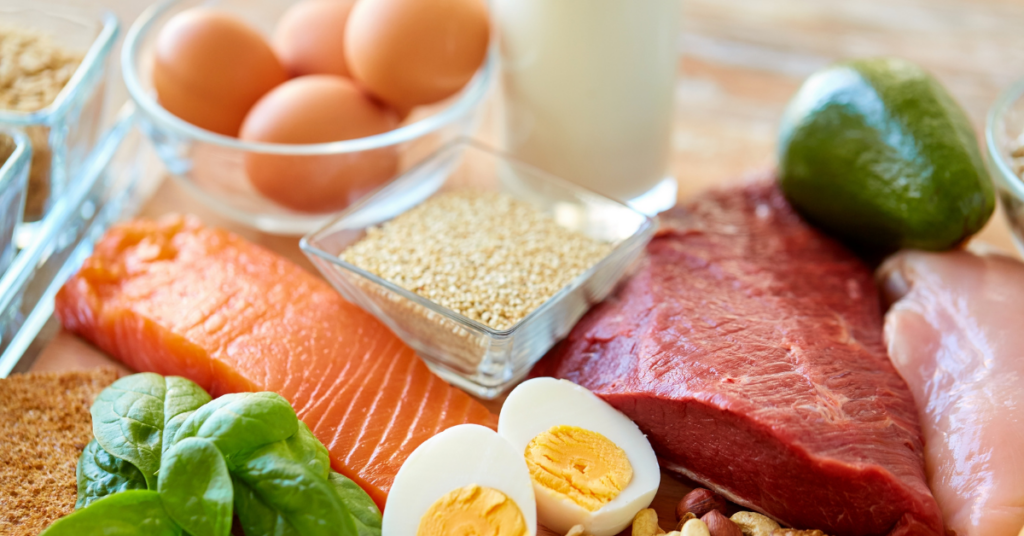So you’ve decided that you want to lose weight. Maybe it was waking up one day, looking in the mirror and finally deciding you’d had enough. Or maybe this has been something you’ve thought about for months, even years, and you’ve finally decided you want to pull the trigger. We here at Stronger U love hearing that. We spend all day long hanging out at on the Internet just waiting for someone to say that they’re ready to try and lose weight so we can put our Coaching hat on, spring into action, and help you get to work.
But we also know that losing weight is a big freaking deal. Changing who you are and what your body looks like is no small feat, and there’s a lot that factors into that. Which is why we want to make sure you’re set up for success when it comes to losing weight. When we say set up for success, we really mean set up for success. We think it’s important you know what you’re getting into here.
How did we get here in the first place?
Call me crazy, but I subscribe to the belief that when we’re trying to go somewhere we need to understand how we got there first. Especially if we don’t plan on ever going back. One of the more important things we can do first is try to understand how we even got in this position in the first place. How did we wind up getting to a place where we woke up one day and decided it was high time we start trying to lose weight?
This is one of those things that sounds obvious at the start, right? We got to this place because we ate too much and didn’t move enough. And while yes, that’s technically right. That’s not the entire story. Not by a long shot. Gaining or losing weight is something that’s simple in theory yet seems to be infinitely more complicated in practice.
Getting to a place where someone has decided they need to lose weight isn’t because of one week, holiday, or weekend. It’s usually a lot more like the old adage of the boiling water and the frogs. It’s a matter of things slowly building over time until finally there’s a tipping point.
Fundamental weight loss truth #1:
The world is not set up for you to lose weight. Getting healthy, losing weight, actively paying attention to your fitness, and any other metric of “healthy” that someone might work at are all things that actively work against what our modern environment is set up for.
I’m not a conspiracy theorist who firmly believes that the government is out to make us fat and sick. I’m not here to tell you how jet fuel can or can’t melt steel beams, and I’m definitely not talking about Lizard People or the Flat Earth Society. What I am saying though is that thanks to all the wonders of technological progress, the rise of consumer culture, the growing prevalence of advertising in every medium imaginable, family dynamics, societal pressures, and many-more-factors-that-I’m-not-naming-right-now our world isn’t set up for you to be in a place where weight loss comes easily.
I’m not telling you anything new when I say that we live in a world that increasingly values fast, easy, and cheap. Convenience is the name of the game in all things, but that seems to be especially true when it comes to our food and the food choices we make. That can be evidenced by the fact that there are over 200,000 fast food restaurants in the United States that feed some 50 million American’s each and every single day to the tune of yearly revenues somewhere in the neighborhood of $200 billion.
But it’s not just adults that buy into the ubiquitousness of fast, easy, and cheap. Kids between the ages of 6 — 14 eat fast food a whopping 157,000,000 times a month. Meaning that we’re legitimately starting our kids off from the get-go to be exposed to, comfortable, and familiar with food that is convenient, easy, and cheap.
While 98% of us say that we all prefer a homecooked meal, the more telling stat, in my opinion, is that 50% of us eat a home cooked meal between three and six days a week. Or put another way, half of us might be eating about half of our meals outside of the house.
That move outside of the kitchen and into the drive-thru can lead to a pretty sharp disconnect from the food that we eat on a daily basis. That disconnect can have a major impact on how much we perceive we’re eating on a daily basis. After all, most of us can agree that it’s quite a bit easier to pack in 2,000 calories because you ordered a #3 12-piece nugget meal at Chick-Fil-A with the large fry and the extra packets of Chick-Fil-A sauce than it is if you were to eat a meal made on your own stovetop.
The emphasis on convenience is one of those things that plays perfectly on human temptation, especially when it comes to food. As food scientists have gained a clearer understanding of what lights up our reward centers, and advertisers have gained a clearer understanding on how to get us to want something, we’ve wound up in the middle of a perfect storm where stores and fast food restaurants put together meals and menu items that are full of the perfect blend of salt, sugar, and fat (scientifically tested, of course) and marketed in just the right way to make you crave it.
Fundamental weight loss truth #2:
We react to and are influenced by more than we realize on a daily basis. This is especially true when it comes to our decision making and how it’s influenced by our own psychological state at that moment in time and the information that we’ve recently taken in.
It’s hard to get crystal clear data, but there are estimates that say we consume roughly somewhere in the neighborhood of 4,000 ads a day — with some estimates placing that number at 20,000 times in a day.
Those numbers are hugely dependent upon the person. I’d bet the clients I have who are in the military or work on offshore drilling rigs consume far fewer advertisements on a daily basis than my coworkers at Stronger U and I. One group of people spends most of their time away from the Internet and in a secluded location where the other group spends almost all of their time on the Internet.
What both groups of people still have to deal with are the fact that all of that exposure can impact our decision making. Especially when so many of those advertisements we’ve run into are specifically designed to move us to eat their product. Products that are specifically designed to play on the reward centers of our brain in just the right way to make us want more of that thing.
Priming is a well-known psychological phenomenon that we can all safely agree that we have fallen prey to at some point or another. Want to see how? Let’s pretend you’re at home. It’s one of those days where everything seems to be going wrong. You’re stressed, tired, and just about done with taking care of everyone else. On top of all of that, you’re hungry.
Just then you catch a commercial for some Marie Calendar’s pie and thought to yourself, “Some pie sounds awesome right now.”
You know that pie isn’t going to be as good as if it were a homemade pie that’s made from scratch. You know it’s not going to taste anything like it looks on the commercial. But seeing that pie on TV still starts to light up the reward center of your brain as you think about how good it would be. You start to respond to the idea of what it would be like if you were able to get your hands on some pie. You might even start to salivate by just looking at the commercial of that pie.
Next thing you know it’s a few days later and your grocery shopping.
You’re wandering down the frozen foods aisle to pick up the frozen veggies and because grocery stores are set up to play on your brain you have to walk past the pie’s before you can get to the veggies. And there’s that pie. You’re not even hungry for the pie anymore but that pie just looks so good — and you remember how that pie looked when it was on TV. You remember how good you thought that pie would probably be. You know you shouldn’t have the pie and that it might not fit within the plan you’ve set up to reach your goals, but at the same time, it’s been a hard day. You had to run errands for the kids for 4 hours this morning. You had to clean the house. You had to pick up the toys and do the laundry. You’re exhausted and damn it that pie does look good.
So what do you do?
You pick up the pie and take it to check out, partly in thanks to a commercial you saw a few days ago. That’s all a decision gone wrong without even bringing the layout of the grocery store into account. Walking into a brightly colored grocery store that’s full of bright lights, carefully curated music to help influence your choices, laid out in a way to make you want to spend more time and money is like walking into a dietary death trap.
Some people might say that’s a pretty gross generalization for how priming works and how our decision making is influenced, and that’s not entirely wrong. We obviously have the power to put the pie back in the frozen foods section. But we don’t always manage to find the willpower to put it back because willpower is fleeting. Hardly anything we do is done in a vacuum all by itself. The decisions we make are a reflection of our value systems, our goals, our psychological state, and can be influenced by things dating back to our childhood.
I don’t mean to get all Freudian on everyone, I’m certainly not about to start getting deep into repression, but it’s not being hyperbolic to say that for many of us, food represents so much more than just food. It represents comfort, connection, and a source of pleasure. Some of those relationships between certain foods and feelings of comfort, connect, and pleasure can date back so much further than we realize, making those desires to buy and bury our pain in certain foods so much harder to get rid of than we ever thought possible.
There are millions of pieces of stimulus fighting for your attention every day. To think that we’re strong enough to fight through all of those decisions each and every single day and come away unscathed is absurd and misguided. This is why at Stronger U, we believe one of the quickest ways that we can start to see diet success by finding ways to get out in front of ourselves when it comes to decision making, as we’ll see later.
Fundamental weight loss truth #3:
Sometimes it feels like the whole world is conspiring against you, and in a way it is.
Oh, and did I tell you that we’re eating more food than ever before?
Up to now, I’ve painted a pretty bleak picture about how our environment, the world we live in, and how our upbringing can shape our decision making. As we’ve seen, we encounter a whole lot each and every single day. Often, when we’re making a choice that’s about food, it’s never really just about food. It’s about all the things that person has been through that day or that week. What that food might have represented for them as a kid. What sort of environmental triggers they might respond to, and more.
While environmental and psychological factors might explain a bit behind the “why” we overeat, they don’t actually touch the “how” behind why we gain weight. They do a good job of pointing to some of the reasons “why” (though not all of them) but the “how” is a totally different story.
Luckily for us, the how is a pretty simple answer that we can all understand with one graph.
Put simply, we eat more food than ever before. The above graph explains that we probably eat about 400 more calories than we used to in 1970. I remember reading in The Hungry Brain that Kevin Hall at the NIH placed the number that caused the obesity epidemic at an additional 218 calories per day. Whatever the actual number is, the point remains the same. We’ve seen a dramatic increase in the number of calories we’re consuming on a daily basis and that’s having a very real impact on our waistlines over the course of a few decades.
But importantly, what the above graph also tells us where our extra food is coming from. As we can see in looking at the graph, the rise in calorie consumption didn’t come from all of us collectively deciding we wanted to mainline sugar like a drug, despite what the meme-makers on the Internet might tell you. Instead, it’s relatively easy to see that added fats, oils, and dairy fats have played a significant and growing role in the calories that we consume on a daily basis.
This explains a lot because as any dedicated Stronger U Member can tell you, fat is the most calorie dense macronutrient there is, at 9 calories/gram. It’s double the calories/gram compared to the other two macronutrients in carbs and fats (both at 4 calories/gram), and it also happens to be the least satiating. Making fat a veritable perfect food for overeating.
And this is all assuming that the above numbers are correct. Because, as study after study has shown. We’re consistently terrible at reporting our food intake accurately and we tend to underreport on a consistent basis. Even if we’re a Registered Dietitian.
All that to say, when you consider the fact that just having a heaping serving of peanut butter could make up that extra 400 calories in a day, it’s not that hard to see how easily we can wind up eating a few too many calories on a daily basis.
(Thank you, Sycamore CrossFit, for the perfect example in picture form!)
So how do we lose weight?
The first step for just about anyone trying to lose weight is going on a diet of some kind. Sounds familiar, right? It’s probably what brought you here in the first place. But choosing a diet is never as simple as, well, just choosing a diet. Not in today’s world.
In a world where choosing a diet can mean choosing between hundreds of different books on the shelf, the diet that your friends and family like, or the diet that really worked for that friend you had from college it can feel like you’re hit with an unbelievable number of different choices, because in reality, you are. Choosing a diet today is no longer choosing just a diet. It’s choosing a Tribe. A place where you now belong. A community that’s going to welcome you into their own secret fold, depending on if you’re a butter-in-your-coffee person or a tofu-and-rice person.
So let’s try to get an important point out of the way first and foremost, shall we?
Fundamental weight loss truth #4:
Calories always count.
All diets argue a few of the same things, no matter if they tell you this or not:
- Eat fewer calories
- Eat more whole and nutrient dense foods
- Eat lean protein
- Drink more water
You can break down every single diet that you come across and they’ll all be using those above principles to work their magic. No matter if someone is talking about how awesome keto was for them and their friends, no matter if they love gluten-free, and no matter if they love being a Vegan.
All diets work by using those same principles. That’s how they influence you to do the one thing that matters most when it comes to diets and finding a diet that works. And what’s that, you ask?
Eating fewer calories.
Remember how above we talked about the fact that we’re eating more food than ever before? That depending on the reference you use, most of us are eating anywhere between 200-400 more calories on a daily basis than we used to? That’s one of the major reasons that we get to be overweight. We repeat those days where we eat 200-400 more calories than we need to, over and over and over again. And that’s the real bugaboo of this whole situations.
In the grand scheme of things, 200-400 calories isn’t that much extra food. It’s extremely easy to know that you overate just a little bit today and tell yourself that it’s “not that big of a deal because it’s really not that much” and you’re right, it’s not that much. But it’s not one day that leads to someone being overweight. It’s doing that on a daily basis, for more days than not, for months and years on end.
A quick aside on how to set your own calories.
We get that lots of people have questions about setting their own calories for their goals, and the Internet might be really and truly amazing, but it’s not the best place to try and navigate when you’re just looking for a simple answer about someone’s daily caloric needs. So here’s a general guide for how Stronger U Coaches set daily calorie intake based on someone’s goals:
- For weight loss: Calories = 10-12 X your current body weight (in pounds)
- For weight maintenance: Calories = 13-15 X your current body weight (in pounds)
- For weight gain: Calories = 16+ X your current body weight (in pounds)
That’s why all diets work and why they all argue the same thing. By getting you to pay attention to what they tell you to, influencing your decision making, and helping you set up certain restrictions they get you to eat fewer calories, helping you lose weight. Because, at the end of the day, calories do count when it comes to maintaining, gaining, or losing bodyweight, no matter the actual macronutrient makeup of those calories.
This is also why I’ve put together a super special order of importance of things that you should pay attention to if you want to lose weight. The best part is that you’ve already checked it out.
If you want to lose weight then the 4 things you should do, listed in order of importance, are:
-
Eat fewer calories
-
Eat more whole and nutrient dense foods
-
Eat lean protein
-
Drink more water
Wait, did you say restrictions?
We’ve come all this way and I literally just gave you the 4 things that you actually need to know in order to lose weight and all you got out of that was the fact that I said something about restrictions? Well, yup. You read that right. It’s not en vogue right now to talk about dieting and restricting things, but that’s a point that I think is pretty important for us to address. Because the sooner we can realize this, the better we’ll all do in our dieting efforts.
Remember up above we talked about that scenario where we wound up going nuts on the Marie Calendar’s pie in the grocery store? All thanks to something that happened a few days before? That’s exactly what I’m talking about with restrictions here. We feel the impacts of our environment, psychological state, temptations, and more on our decision making each day whether we’re conscious of it or not. One of the simplest and fail-safe ways we can try to battle the ways that our decision making is influenced by other factors is by placing restrictions on our decision making.
In order to lose weight, you’re going to have to do some things that you probably haven’t done up to this point. For many of us who are in a position where we want to lose weight that means we’re going to have to restrict our decision making around food.
That’s not to say that you’ve got to abide by any and every restriction out there in the dieting world. If you listen to enough people just about every single food that you can find in a grocery store is off limits. And no matter what the deepest depths of the Internet tell you, you can’t survive off of just air alone.
Restriction actually means dieting success.
At Stronger U we’re a fan of setting up certain restrictions to help you guide your decision making. The way we go about that is by helping you learn to control for calorie and macronutrient intake. You can kind of think about these like a series of guardrails. We set up your macronutrients based off of your goals, history, preferences, and more. Those macronutrient targets then act as a series of guardrails with:
- Total calories being the outermost guardrails
- Protein is the next guardrail
- Carbs and fats being the innermost guardrail in terms of importance
We set it up like this for a few reasons, but one of the most important being that It’s a natural human impulse to not want to give anything up, especially our food choices. We can almost all agree that when someone tells us not to eat Doritos Cool Ranch with Doritos Nacho Cheese mixed in the bag all we can think about is how good Doritos Nacho Cheese would be if they were mixed up with Cool Ranch. We’ll think about it all day long until before we know it we’re walking into 7/11 just to make up our weird Doritos experiment. All because someone made an offhand comment about not eating something that they’d never actually made before.
Maybe it’s extreme but, restricting food choices is hard and stressful. That’s exactly why we use other restrictions to help you learn what you would most like to restrict.
See, you know those guardrails I talked about? The calories and macronutrients? Those guardrails function as your teachers. When you sign up for Stronger U one of the first things you start doing is you start tracking your food intake so you can see how you’re doing in an attempt to get closer to those targets that we’ve set for you.
When we say tracking food intake we don’t mean just writing down what you ate, either. We mean learning how to weigh and measure the things you’re eating on a daily basis with a food scale. Learning how to find the nutritional content of the food you’re measuring in MyFitnessPal. Learning how to log those foods you’re eating daily, and learning how to structure your day so that you can eat foods that support your goals while also finding room to eat the things you love.
This isn’t a good practice just because we do it, tracking your food intake is a good practice because it teaches you skills that will last you a lifetime.
Tracking like this teaches you skills like awareness and understanding. It helps to pull back the curtain so you can actually see what your food is made up of. No longer do you just eyeball some peanut butter and think “Hmm. That seems good.” No. Now you know just how much peanut butter is actually enough peanut butter. Because as we’ve seen, it’s real easy to wind up in a peanut butter trap.
Sure, it probably sounds insane to some people. We get it. Remember what we spent a whole bunch of paragraphs talking about not too long ago. The world we live in isn’t exactly set up to value paying special attention to the foods you eat on a daily basis. Because we don’t value that sort of attention, awareness, and understanding it can come across as pretty weird at first. But it also something more than just a little weird. It helps you learn which foods you need more of and which foods you need less of.
At Stronger U we’re not fans of telling you which foods you need to restrict. That’s not to say we’re not for restricting foods, we just believe that everyone has foods they should probably restrict more than they do others, and that most people do best when they learn what those foods are for themselves. We think that people best learn that skill through learning how to track their macronutrients and calories.
We see it over and over again, but there really is something magical that tends to happen when someone has been tracking their food for a few weeks and send in an email that goes something like this:
“I was going through my weekly food prep for this coming week and as I was starting to pick at the meals I was making for my kids I had a moment where it all hit me. It’s a normal habit for me to graze over my kids’ lunches as I make them. I always do that. But after having to log eating the animal crackers, those grapes, that mini-cupcake, or whatever it is I’ve started to learn that I just don’t have as much room for those foods as I thought I did. I like them, but eating them now means I don’t have room for ice cream later, and that’s just not a tradeoff I want to make.”
Check-in emails like that perfectly illustrate how we want people to learn their own version of restricting foods. Because restricting foods doesn’t mean bad things or that you can no longer have the things that you love. It just means saying no right now so that you can say yes later on.
But we’re not done. Because you know what happens when people start to see what their food is actually made of and start to simplify their decision making? They become more successful dieters.
Studies have consistently shown that dieters who have fewer food choices tend to be more successful. That’s obvious when you think about dieters who might be in a highly controlled experiment and have each and every single food choice made for them, but it’s equally obvious when we look at dieters who inhabit the same world that you and I do. People that limit their food choices and don’t fall victim to all the thousands of different food choices we’re faced with on a daily basis do better.
Therein lies the real magic of why learning to track your food intake might be one of the most important skills you learn this year. Doing so teaches you what the nutritional makeup of your food actually looks like. There’s real value in starting to understand what the nutritional facts of sour cream is. But that’s not it. Learning the nutritional value of sour cream also helps you to understand that not every day can be a day where we budget sour cream into what we’re eating that day.
Or maybe you love sour cream enough that you want to make it a part of your daily diet. There ain’t no shame in that sour cream game. But if that is the case, learning to track your food intake then, in turn, also teaches you how to start to budget for that sour cream.
For some people who have actually made it this far talking about the importance of tracking sour cream is going to be a major turn off. I’m not sure why, but sour cream just may have been where the line had to get drawn and we crossed that line. Learning that a serving of sour cream was two tablespoons was a piece of banal and seemingly useless information that was one step too far. It was becoming a “weird” person that paid so much attention to their food. It was “changing” who they were. It was becoming someone different.
Which brings us to the most important point of all.
Fundamental weight loss truth #5:
Anytime you’re trying to change who you are, anytime you’re trying to change something fundamental about yourself, especially something as fundamental as the physical makeup and shape of your body, you’re going to have to change aspects of who you are.
We get to the point of needing to change certain things about our behavior by behaving a certain way. We can’t wake up every day and plow through a bag of Sour Cream and Onion Ruffles while dipping them in French Onion dip and then be disappointed when we wake up 15 years later and don’t see a six-pack staring back at us in the mirror. If abs are the goal, we’ve got to stop behaving like the person behaved that wound up being disappointed with what we saw in the mirror.
I know, I know. Saying that sounds like it’s this really harsh truth that is uncomfortable for all of us to hear. But it’s also something that we all implicitly understand. We all have friends who do the dumbest things and constantly complain about the results of their dumb actions. Maybe it’s your friend who constantly complains about never finding anyone that they actually want to date, but that same friend is spending 4-5 nights a week in bars that still sell Bud Light for $1 instead of spending time at a bookstore or community event.
We all get it. We’ve all seen it. We all know that to change something about ourselves we have to change who we are. But for some inexplicable reason that can feel like we’re breaking up with some deep and irreplaceable part of ourselves. In a way, that’s true. By changing how we behave on a daily basis we’re breaking up with a piece of our Self. The piece that behaved that way. The piece of our Self that got us to this point.
As soon as we start to try and shed that skin and step into the new person we’re becoming that old piece of our Self can try to latch on like an old ex, and just like an old ex, it won’t want to let go. It’ll remind you of all the fun you two had. It’ll tell you all about the nights that you two stayed in and watched re-runs of The Office and why you don’t want to leave those days behind.
You have to be ready for that. It’s a piece of this journey that each and every single one of us goes through. This is where having a Coach and a community can become invaluable. None of us are strong enough to go it alone like a lone wolf our entire journey, and we shouldn’t have to try in the first place. There’s value in leaning on people who have been here before. People who have gone through their own transformations and seen others go through transformations. Those people can pick you up when you’re feeling down and remind you that there’s no real reason that you need to get back together with your ex.
But when you do change, everything else changes along with you.
I like to think about it to being like Neo who sees the world as it is for the first time in The Matrix, but I think when people truly do go through this kind of journey and embrace fundamentally changing who they are it’s like seeing a new person emerge. It’s a person who has shifted their identity through how they behave on a daily basis. It’s a person who is now comfortable, confident, and aware of the choices that they’re making on a daily basis. On top of that, they’re aware of how those choices fit within the context of what they’re doing right now and what their long-term goals are.
Someone in Neo’s position hasn’t just been shown how the world actually looks thanks to someone handing them a pill, though. They’ve earned it. Through their hard work they’ve developed the skills to understand what’s going on. They’ve learned how to cultivate discipline and responsibility, as well as learned how to roll with the punches and keep the long-game in mind. They’ve built themselves a utility toolbelt of skills to handle just about every situation imaginable that even Batman would be jealous of, all through learning how to track and budget their food.
Taking on the challenge of losing weight can often feel like an impossible task. As I’ve spent 5,000 words talking about, there are so many pitfalls to weight loss. One could certainly say that their weight isn’t all their fault, but it’s certainly their responsibility. The entire world can seem like it’s conspiring to keep you from losing weight, and in a lot of ways it is. It’s easy to fall into that old trap of paralysis by analysis because as we’ve seen, there’s a lot of so-called “solutions” to choose from. Even if they all sell the same thing.
At Stronger U I’ve got no problem in admitting that we’re biased in thinking that we hold the answers to helping you lose weight, learn the skills to keep it off for a lifetime, and fundamentally change who you are. I’ve got no problem admitting that because I see it every day. I see the transformations that come in and read the stories of people who have taken back their life. But I didn’t come all this way to give you a sales pitch, so instead what I’ll say is this:
There’s real power in starting. In taking one single step. The tiniest one you can manage. Maybe it’s learning how to track your food intake accurately with your food scale and MyFitnessPal. Maybe it’s auditing your environment to see the areas that your decision making is being impacted. Or maybe it’s getting an accountability partner. Only you can say what the right answer is going to be. No matter what your answer is, take that first step. Because that first step is your stepping stone to a new you.









